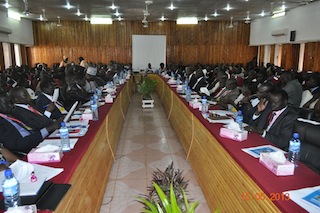Give no more room to “betrayers of the nation”, says WBEG governor
May 16, 2013 (JUBA) – South Sudan should give no more concessions to “betrayers of the nation”, the governor of Western Bahr el Ghazal state said on Thursday, in an apparent reference to rebel groups active in Jonglei, Unity and Upper Nile states.

“We are obligated to stand firmly and give our full support to the hierarchy of the SPLM and to our national government and give no more room to the betrayers of the nation. The unity of the people of South Sudan should be the [noble] goal to peace lover[s] in the republic”, he said.
A group of around 3,000 rebels recently accepted an amnesty offer by president Salva Kiir and crossed back into Unity state from neighbouring Sudan. However, rebels loyal to David Yau Yau’s movement in Jonglei and John Uliny’s group in Upper Nile state have so far rejected the offer.
GREAT EXPECTATIONS
Speaking at a conference he is hosting in Wau for the four states of South Sudan’s north-western Greater Bahr el Ghazal region, Hassan said citizens had “great expectations” that the meeting will find ways to improve security and food production that could help the region become the breadbasket for the rest of the country.
In a copy of his opening remarks received by Sudan Tribune, Hassan said the region “should set an example for the whole South Sudan, to appreciate the sacrifices of our fallen heroes, heroines and martyrs that gave their lives for [an independent state]”.
South Sudan gained independence in 2011 after decades of conflict with various Khartoum governments.
Hassan said that South Sudanese should make the most of their hard fought independence by working for the “common good” and providing services that meet the aspirations of the people and help the nation building process.
The speaker of the South Sudan’s national legislative assembly, James Wani Igga, also spoke at the opening session of the Greater Bahr el Ghazal conference in Wau town, where he is participating on behalf of president Kiir.
DISPUTES WITH SUDAN
Igga called on citizens to reject tribal politics and urged them to help the government consolidate peace and reconciliation efforts in order to focus on settling post-secession disputes with Sudan.
“I want to sincerely give you a vote of thanks for organising this conference. The people of Bahr el Ghazal are great people. Your support to the movement was unshakable and you should continue with this spirit because the journey we started has not been completed”, Igga told the conference.
“The independence is one of the steps we have taken but the whole journey is in progress. There are a lot of challenges for us to address together because we are still on a rough road fraught with lots of invisible thorns and mud. But I must assure you that the government and the leadership of the Sudan People’s Liberation Movement are fully committed to achieving the principle objectives and the vision of the movement”, he added.
Igga said South Sudan remained fully committed to pursuing ways to resolve post-secession disputes with the government of neighbouring Sudan, but did not elaborate on how the country’s leadership plans to resolve contentious issues such as Abyei and other contested regions, as well as the demarcation of oil-rich border areas.
“Our team responsible with the border file is in Addis Ababa to present our collections to the African Union experts on [the] border. It is led by the minister of parliamentary affairs”, Michael Makuei Lueth”, Igga told reporters.
BORDER DEAL WITH DARFUR
Governor Hassan also informed the conference of the efforts being made by his administration to reach an understanding with Sudan’s western region of Darfur, which borders Western and Northern Bahr el Ghazal states, to exchange those abducted during the conflict, as well as encourage cross-border contacts and movement.
“The border with Darfur is relatively stable but there is an illegal migration activity by pastoralists in the area. Early this year there was an incident in Kit Kit, Balbala, Abjuko where our forces were attacked and some women and children were abducted. Other[s] were injured and murdered. But last month we reached an agreement to exchange abductees. Eight women with nine children were released from that side to us. We also made [the] release [possible] of three women and six children”, he explained.
RELATIONS WITH CENTRAL AFRICA REPUBLIC
The governor further underlined that his government was closely monitoring the security situation at the border with the Central Africa Republic (CAR) where a coalition of rebels recently toppled the government and declared themselves the new leaders of the country.
Neighbouring countries are awaiting further information on the new regime’s foreign policy.
“At the moment we are relatively in peace at the border area with [the] Central [African] Republic. We are monitoring the evolving events which remain grey so far”, Hassan said.
(ST)
